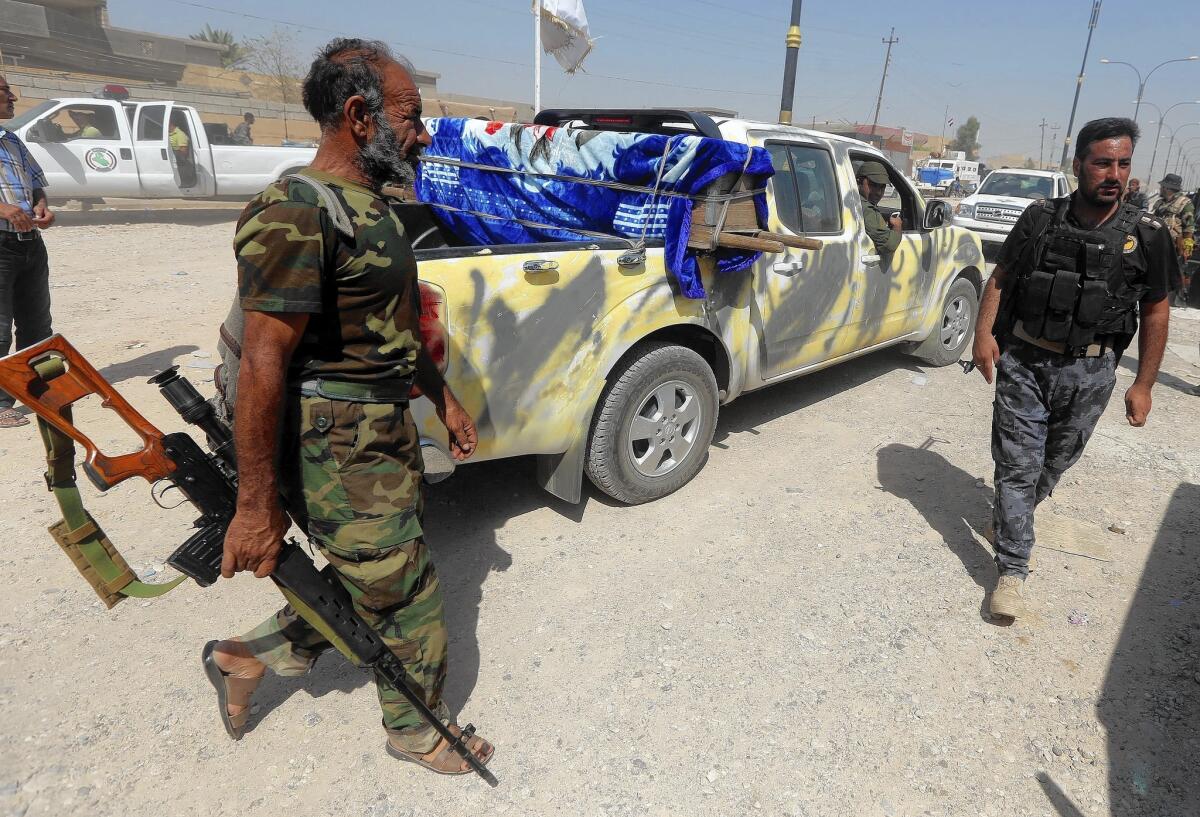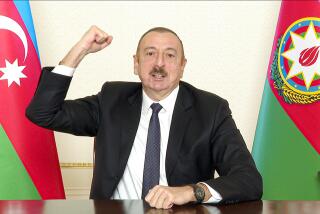Iraqi Kurds, buoyed by U.S. airstrikes, eye more Sunni Arab towns

- Share via
Reporting from Barazan, Iraq — Jubilant boys flashed victory signs and unfurled a Kurdish flag at the entrance to this abandoned village, signaling the latest advance of fighters known as peshmerga against militants in northern Iraq.
On a nearby wall, “Peshmerga,” spray-painted in gold scrawl, blotted out the black-and-white insignia of the militant group Islamic State.
Kurdish forces, backed by U.S. air power, have been pushing back the extremists for several weeks, steadily making gains along the Tigris River valley and near the Mosul dam, breaking the momentum of the group formerly known as the Islamic State of Iraq and Syria, or ISIS.
Many of the militants who last month swept triumphantly into Barazan and other areas previously under Kurdish control — even approaching Irbil, the capital of the semiautonomous Kurdish region — have retreated. Kurdish forces report having almost complete control of Zumar, about eight miles to the south, though clashes were said to be continuing there.
Littering the highway leading to Barazan is the charred and twisted evidence of U.S. airstrikes, including the carcasses of Humvees and pickup trucks, once part of Islamic State’s formidable motorized columns. About 75% of the U.S. sorties have targeted Islamic State positions close to the Mosul dam and the adjacent reservoir, according to the Pentagon.
“The [air]strikes are 100% helpful and they are unparalleled,” said Hassan Khalo, a local official of the ruling Kurdish Democratic Party.
Kurdish authorities, whose fighters cooperated closely with the U.S.-led invasion force that toppled the Iraqi government of Saddam Hussein in 2003, seem enthusiastic for as much American participation as possible.
The air assault has buoyed the confidence of Kurdish fighters, who were humiliated last month after being routed by Islamic State forces. U.S. air power has turned things around, at least for now. The Kurds have regained lost territory.
Though Kurdish residents have welcomed the peshmerga advance, many Arabs are wary of the Kurdish presence. Tensions have long simmered between Kurdish and Arab residents in northern Iraq, site of conflicting territorial claims.
Barazan is one of the few exclusively Arab villages in the area. Whereas Kurds generally despised Hussein’s rule, many Sunni Muslim Arabs backed Hussein, a Sunni from an Arab tribal background.
This village of perhaps 5,000 people, say Kurdish authorities, was named after Saddam Hussein’s half brother and former intelligence chief, Barzan Ibrahim Tikriti, who was the five of clubs in the playing card deck of “most wanted” Iraqis distributed by U.S. forces. Tikriti was hanged in 2007.
According to Kurdish officials, Barazan was created as part of the Iraqi government’s so-called Arabization project, in which Kurdish land was appropriated and parceled out to Arab tribesmen and Hussein loyalists, including many members of the military. Kurdish authorities have been encouraging Kurdish resettlement in contested zones.
Kurdish commanders say the residents of Barazan largely welcomed the militants. A major component of the extremists’ appeal has been capitalizing on Sunni Arab animosity toward the Shiite-dominated central government in Baghdad and toward the Kurdish administration in the north.
“Daesh didn’t require much to get this village: They came in with 20 or so insurgents, and they immediately had the support of a thousand men,” said Col. Natheer Rassoul, a peshmerga commander, using the Arab term for Islamic State. “The insurgents were given food and shelter by the people.”
Islamic State has recruited heavily throughout the area, Kurdish officials say, bolstering their ranks.
On Wednesday, this dusty village appeared largely abandoned, the occasional cow the only sign of life in fields strewn with shrapnel and garbage. Many Arab residents apparently fell back with the fighters from Islamic State.
It is unclear how far Kurdish forces will advance on largely Arab territory, though they seem intent on retaking Zumar, a predominantly Arab town.
Kurdish commanders are aware that they will face stiff opposition if they attempt an assault on Mosul, the region’s major Arab city and an Islamic State bastion. The conflict appears to have exacerbated the historical tension between Kurds and Arabs.
In Barazan, the Arabs may not be welcomed back.
“We won’t accept them into the area again,” Rassoul said, shaking his head. “The leadership has to decide, of course, but if it were up to me, they would never come back.”
Bulos is a special correspondent. Times staff writer Patrick J. McDonnell in Beirut contributed to this report.
More to Read
Sign up for Essential California
The most important California stories and recommendations in your inbox every morning.
You may occasionally receive promotional content from the Los Angeles Times.














